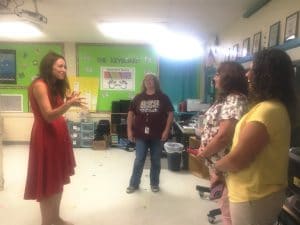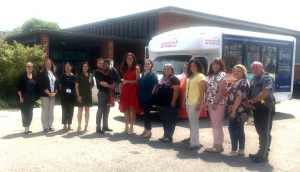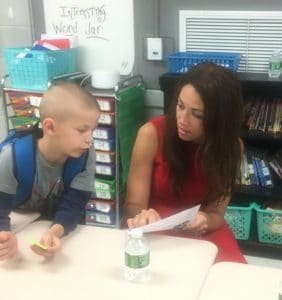June 11, 2022
By: Dwayne Page
Tennessee Education Commissioner Dr. Penny Schwinn visited Smithville Elementary School on Friday as a part of the ‘Accelerating TN 2022 Tour.’
The initiative spans 50 school districts in three weeks to highlight summer learning opportunities in different school systems. As the Commissioner and those who accompanied her stepped off the bus, she was greeted by Director of Schools Patrick Cripps, members of the central office staff, SES Principal Summer Cantrell and teachers at the school. State Representative Terri Lynn Weaver was also there.
These summer programs stem from the Tennessee Learning Loss Remediation and Student Acceleration Act and Tennessee Investment in Student Achievement Act, which is the first update in over 30 years to the way the state funds public education.
“The tour is going well,” said Commissioner Schwinn. “We are able to talk to students, teachers, and district leaders about the great work they are doing in the public schools in our state and frankly it’s an opportunity to celebrate the great work of our schools. We talk about a lot of things that are wrong but there is so much more that’s right and you get to see that on tours like this,” she said.
“I am hearing a lot of really strong excitement about early reading on the tour. There’s a lot of focus there. People are loving summer school and wanting that funding to continue because they are seeing great results. We are seeing some kind of stress around getting scores back and what that means but I am feeling very optimistic about achievement and what we will see in our state tests. I am also seeing a lot of relief to get back to normal. A lot of folks say it feels like we are back to who we are and what we know how to do, and we can do our jobs and see great results with our kids,” she continued.
During her visit to Smithville Elementary School, Commissioner Schwinn went into classrooms and sat with children as they were doing their summer schoolwork.
“I just asked the students what they like about the summer programming, what was their favorite subject. Some liked math. Others liked reading and STEM. Everyone liked recess and snacks. I also wanted to learn more about them. We had a couple of students talk about what it meant to them to be in summer school and how important it was and how successful they feel. You can’t measure that on a test, but you see there is more impact besides just the economics and that’s lovely,” she continued.
During the General Assembly’s 2021 special legislative session on education, legislators passed the Tennessee Learning Loss Remediation and Student Acceleration Act, which set forward a path for all districts’ current and future summer programming opportunities to benefit students and accelerate achievement. This year, the General Assembly passed the Tennessee Investment in Student Achievement (TISA) Act, which updates the way the state funds public education for the first time in over 30 years and prioritizes the needs of each individual student. Commissioner Schwinn said she is excited about what TISA will do for education in the state
“It’s the largest investment especially in recurring dollars that we have ever done in public education. I am very grateful to the governor and general assembly. It will impact districts like DeKalb County which will get more funds to do this great work and do it even stronger than they have before,” said Commissioner Schwinn.
“It was great to see the Commissioner and show her what is happening in our summer camps and the great work that our teachers, administrators, and students are doing. She got to go into the classrooms and see some of the work the students were doing. She enjoys visiting with kids and likes to see things from their prospective as well,” said Director Cripps.
Summer school is a state mandated program, but student participation is voluntary.
“We have to provide it for students up to seventh grade but in our case, it goes up to the high school level where we use federal funding for that program. It gives kids the opportunity to work on skills to get ready for next year. At the high school level, it helps those kids that may not have passed a class to recoup that credit and take the next class available for them,” said Director Cripps.






